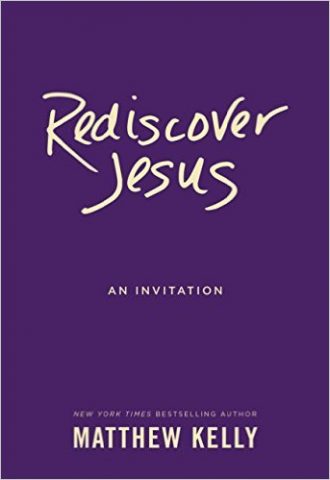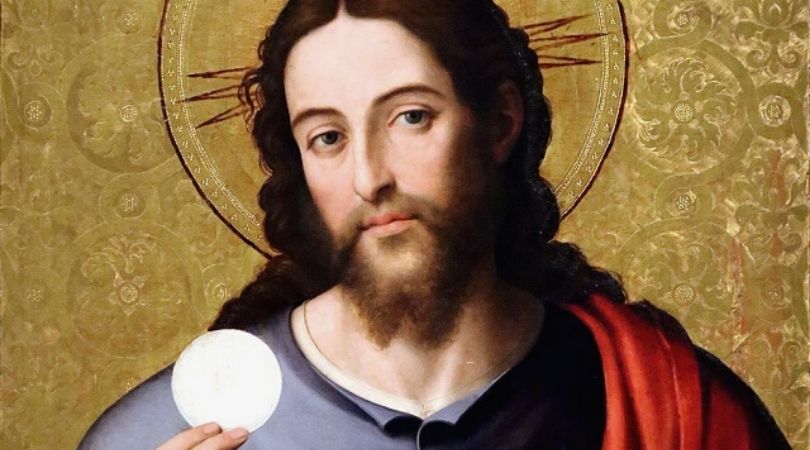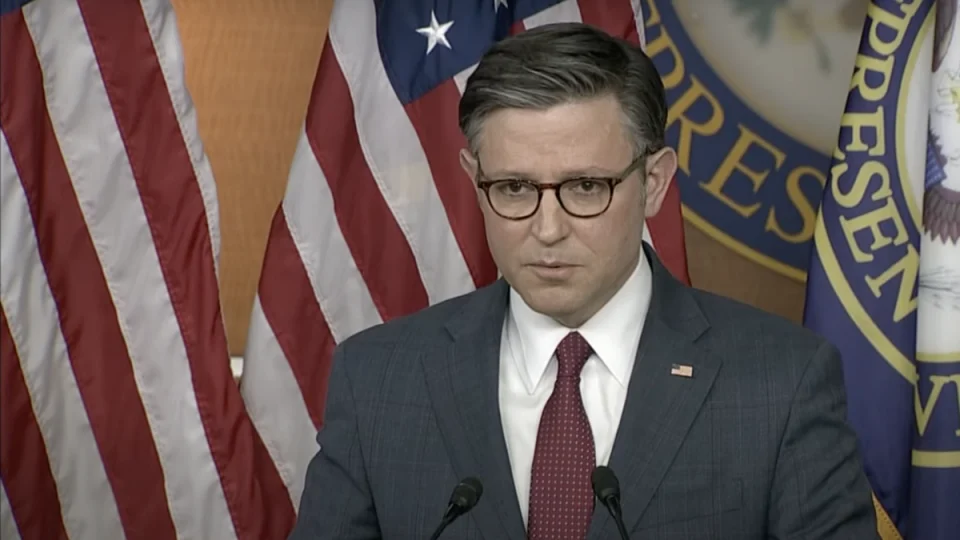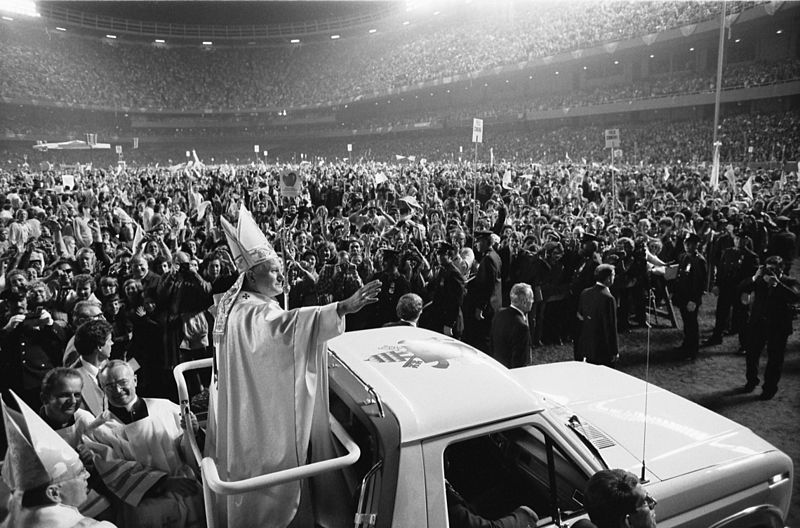Leading up to that discovery, I sensed I was on the path of looking for more meaning. I just needed a guide; one who could identify and acknowledge that the faith still mattered in this emerging millennial adulthood. Friends and peers were abandoning the church in droves, and one crisis or another seemed that the two-millennia old foundation was about to crumble for good.
It was Christmas Eve 2010. At the end of the Christmas Eve Mass at St. Michael Church in Independence, Ohio, the pastor, Fr. Pete, announced the ushers would be distributing a free book to every family in the congregation as we left to begin our Christmas festivities. I walked with my mother out the side door. True to Fr. Pete’s words, a friendly usher held out a book. “Some light reading,” he joked.
I took it, feeling the 300-plus-page paperback. I had never heard of it or the author. I notated my first impression: surprise that someone actually took this subject on. This is exactly what I have been thinking about. I thought I was alone.
Surprise…and admiration. Perhaps indeed there was indeed someone, I thought, who had a sense our collective moral compass had long since broke—and unafraid to speak about the Catholic faith in our time. By then I had so bought in to believing the church had little wise input on living reality in the new millennium, especially after the death of John Paul II, that I unwittingly and unknowingly echoed Nathanael’s own incredulity: “Nazareth! Can anything good come from there?”
“Come and see,” his friend, Philip, replied in John 1:46.
The book was Matthew Kelly’s Rediscover Catholicism: A Spiritual Guide to Living with Passion & Purpose. And here was someone doing something about it. “The loss of our essential purpose,” he writes in it, “is the cause of the great modern madness.”
It was the beginning for me of realizing a life philosophy: there are two paths in life—action, and reaction. There are those who do something, who “put out into deep water” (cf. Luke 5:4), and there are those who react to it. Indeed, Kelly touched on it in that very same book. “The whole world will get out of the way for the man who knows where he is going. For the man who does not, the world becomes a playground filled with distractions and nothingness.”
Here was action being done.
The world got out of the way for Matthew Kelly a long time ago. In turn, he devoted it to bringing it back to Christ. His spiritual memoir, A Call to Joy: Living in the Presence of God, was published in 1997. Kelly was in his early 20s. It is less about the author than it is about what the author wants his readers to feel—and do. And even then he makes it clear how one’s priorities should be oriented: “Prayer is the key to all the deepest desires of our hearts.”
Indeed, as is so often with Kelly, just now as I went to quote that line about prayer from my own copy of A Call to Joy, I got caught in momentary contemplation reading the paragraph above it. There he is talking about how too much television can command one’s life to destruction. His continual emphasis is to preserve one’s immortal soul to achieve communion with God, both here and in the life to come.
“Being concerned with the life of the soul is about being countercultural,” he writes in this paragraph. “It is about expanding the mind beyond the things of the material realm. The television and the world are concerned with the body and the temporal” (emphasis mine).
Here summarizes the discontent I felt as a cog in the secular machine. Life was becoming too temporal. Frustration over only the tangible was mounting. Where was the transcendence, wonder and awe?
And then I rediscovered Catholicism.
Today, Kelly’s Dynamic Catholic Institute is practically a household name among Catholic families and others seeking deeper meaning. Dynamic Catholic has dove into reshaping the culture through its events in parishes and dioceses, pilgrimages, talks and lectures that have been distributed by listeners to friends and family, or by Kelly’s videos series, such as Decision Pointson EWTN. By now, Kelly himself has authored over two dozen books, such as The Rhythm of Life, The Four Signs of a Dynamic Catholic, Rediscover Lent, Rediscover Jesus, Resisting Happiness, and The Seven Levels of Intimacy. Dynamic Catholic’s publishing arm, Beacon, has given authors and readers an avenue to help rebuild the Catholic intellectual tradition.
But the fundamentals—prayer, the sacraments, “the classroom of silence”—listening for the answer, What does God want from me?—remain Kelly’s priorities.
It is telling that Kelly chose the title and theme “rediscover.” It is not Discover Catholicism, or Discover Lent, or Discover Jesus. It is Rediscover Catholicism and Rediscover Jesus. Matthew Kelly is telling his audience of Catholics to seize the name, identity, and meaning of “Catholic,” to revive it anew, to imbue it into one’s everyday life, and embrace the results of how it will change you.
In this way, addressing the rather uncomfortable observation in Gaudium et Spes, no. 19, emerges. While so often secular humanism and materialism are cited as reducing the active living of the faith, here Gaudium et Spes points within: “[B]elievers can have more than a little to do with the birth of atheism. To the extent that they neglect their own training in the faith, or teach erroneous doctrine, or are deficient in their religious, moral or social life, they must be said to conceal rather than reveal the authentic face of God and religion.”
This is what Matthew Kelly seeks to address and topple in his work. Conversion is never out of one’s reach.
Action…and reaction. “Thought determines action,” he has said. “Do not let your whole life be a reaction to the things that happen around you. Let your life be an action.”
Rediscover Catholicism ignited a renewed, serious engagement with the faith. It ignited approaching the liturgy more reverently, listening and reading Scripture for its wisdom, even in the Mass’s orations, such as the Collect. It ignited incorporating the sacraments more seriously. It ignited thinking about God and humanity’s relationship with Him. It opened the floodgates to others who have actively set out to understand what being Catholic means: it introduced me to the Church Fathers, St. Catherine of Bologna, Dante, Pascal, Chesterton, Joseph Pearce, Peter Kreeft, Robert Spitzer, SJ, James Schall, SJ, Mary Eberstadt, Joseph Ratzinger/Benedict XVI, among countless others. And it challenged me to consider how I would contribute.
There is a prayer in Rediscover Lent that summarizes believing in our times:
“God of deep waters and infinite riches, challenge me to go where I fear, to do what is difficult and what I thought could never be done. Push me to go to the deep waters of life and cast my net wide, for I put all my hope, trust and faith in you. Amen.”








